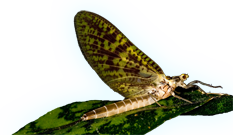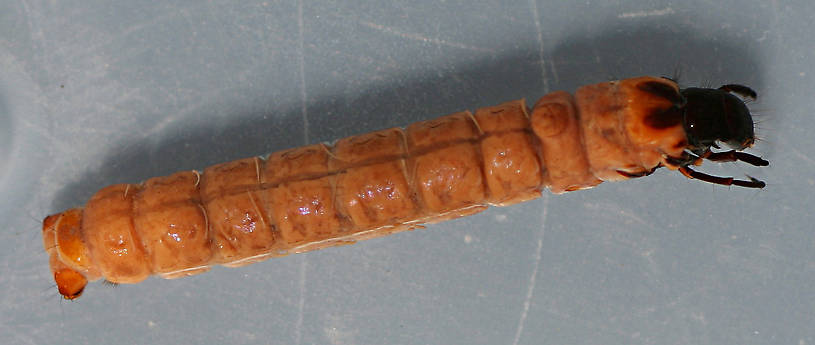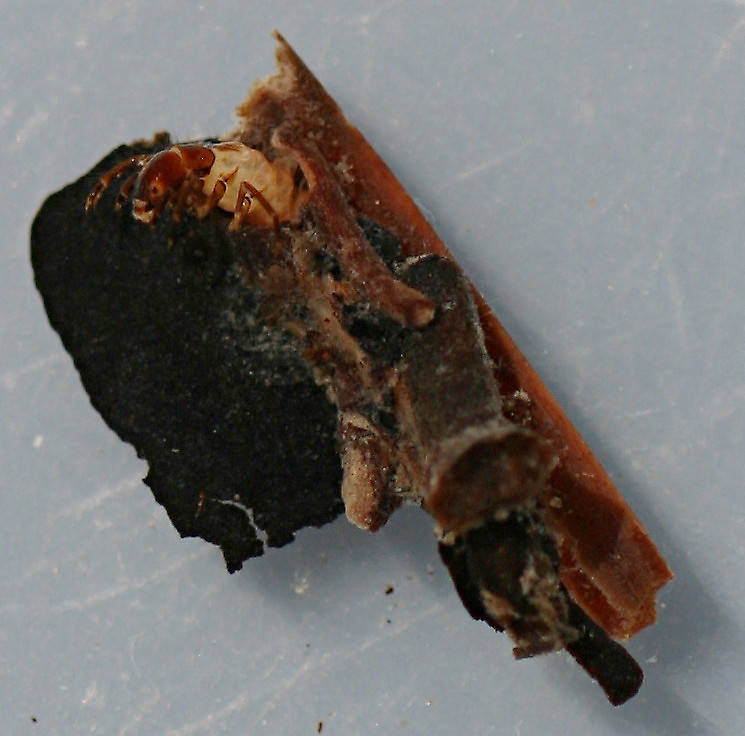Blog & Latest Updates
Fly Fishing Articles
Insects by Common Name

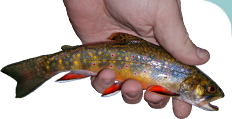
> > Heteroplectron californicum
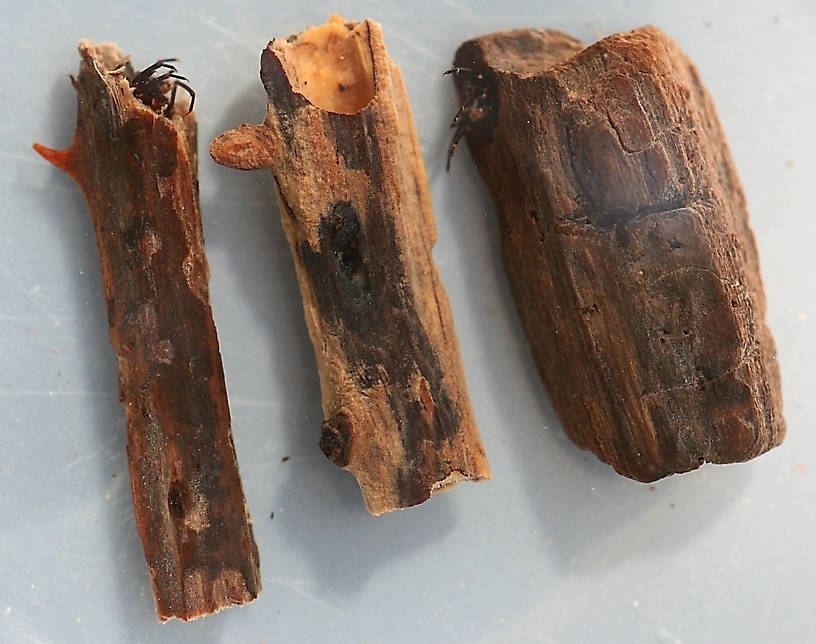
Collected September 19, 2010. Mature larvae with cases. Cases left to right; 29 mm, 26 mm and 20 mm. Larvae from left to right; 21 mm, 19 mm and 17 mm. In alcohol.
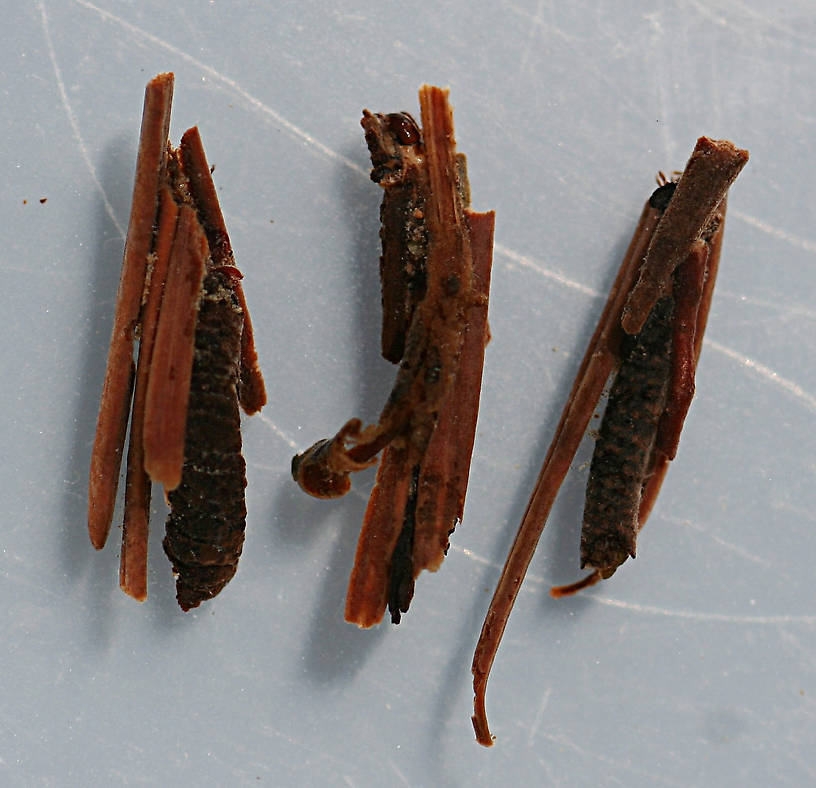
Collected August 17, 2009. Immature larvae and cases. Cases 8 - 14 mm. Larvae 6 -8 mm. In alcohol.
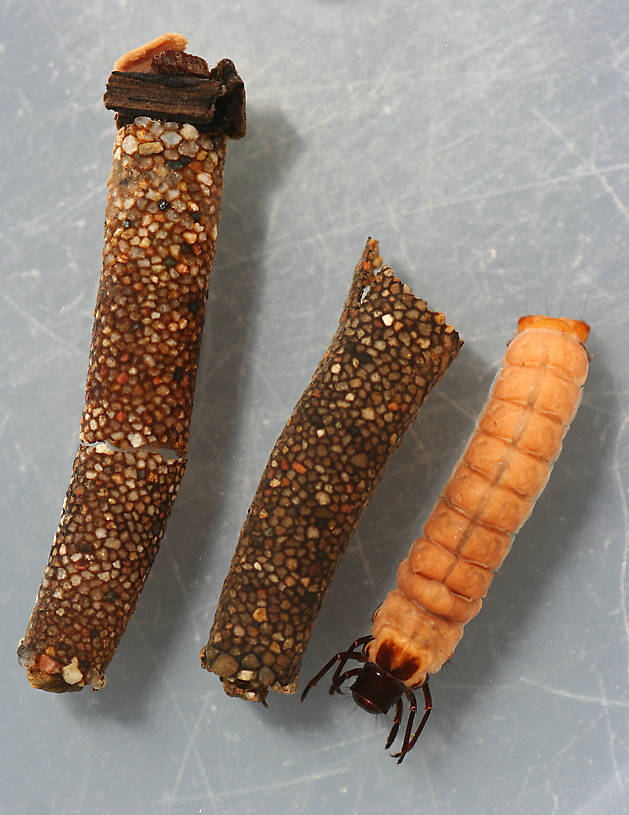
Nerophilus californicus cases used by Heteroplectron californicum larvae. Heteroplectron larva in photo was using the case on it's left.
| Millcreek | September 29th, 2014, 1:07 am | |
| Healdsburg, CA Posts: 356 | These larvae are common in Mill Creek (a tributary to Dry Creek which empties into the Russian River). The larvae were keyed to genus using "Larvae of the North American Caddisfly Genera (Trichoptera)" by Wiggins (1996) and with Merritt, Cummins and Berg (2008). There are only two known species of Heteroplectron in North America, H. californicum and H. americanum. H. californicum is found only on the west coast and H. americanum only on the east coast. Mature larvae bore a hole through a piece of water-logged wood and use it as a case. The inside of the case is lined with silk and the posterior end is plugged with a small stone or piece of vegetation held in place with silk. Smaller larvae make a somewhat ramshackle case of bits of wood with Douglas fir or redwood needles attached to it. Both methods make very effective camouflage. I only noticed them at first when I was looking for other stream critters and noticed a piece of wood heading upstream on the streambed. Some mature larvae will appropriate another caddis case for use. The last photo shows a Heteroplectron californicum larva that was collected while using the case of Nerophilus californicus. I initially thought that the case on the left was a spent pupal case of N. californicus but Wiggins (1996) says that H. californicum often attaches small pieces of wood to the anterior edge of cases it appropriates. Nerophilus californicus does not use these small pieces of wood in it's case construction. H. californicum larvae are usually found in slow water on the edges of pools and glides. | |
| Taxon | September 29th, 2014, 1:36 am | |
Site Editor Royse City, TXPosts: 1350 | Very cool, Mark !!! | |
| Best regards, Roger Rohrbeck www.FlyfishingEntomology.com | ||
| Millcreek | September 29th, 2014, 1:54 am | |
| Healdsburg, CA Posts: 356 | Very cool, Mark !!! Roger- Thanks, glad you enjoyed it. | |
| Gutcutter | September 30th, 2014, 5:38 pm | |
| Pennsylvania Posts: 470 | It's also time for the great brown autumn sedge out this way. I believe they are Pycnopsyche genus. I've picked up the cases and they look similar to those above. Any hatch behavior tips for us Easterners? | |
| All men who fish may in turn be divided into two parts: those who fish for trout and those who don't. Trout fishermen are a race apart: they are a dedicated crew- indolent, improvident, and quietly mad. -Robert Traver, Trout Madness | ||
| Millcreek | September 30th, 2014, 7:57 pm | |
| Healdsburg, CA Posts: 356 | Gutcutter - The cases of Pycnopsyche are similar in appearance to the cases for the immature larvae above, but they're different families of caddis, Calamoceratidae for the Heteroplectron above and Limnephillidae for Pycnopsyche.Any hatch behavior tips for us Easterners? About the only hatch behavior I can give you on Pycnopsyche is not to listen to anything I say about them:). I'm just not familiar with them. If your eastern species of Heteroplectron is similar in habits to our western one they seem to emerge sporadically in late summer and early fall. You're more likely to see adults during the daylight hours than in the evening or night. | |
| Jmd123 | September 30th, 2014, 8:57 pm | |
| Oscoda, MI Posts: 2611 | "It's also time for the great brown autumn sedge out this way." A.k.a. the "October caddis"? If I can recall those are about a size 10 and a sort of cinnamon-brown. Wish we had more of them around here, as caddis are still hatching nicely on our warmer nights. My last outing on Sunday evening had a solid hatch going and plenty, if rather small, fish feeding on them...too bad the season ends at midnight tonight... Again Mark, very nice photography! Jonathon | |
| No matter how big the one you just caught is, there's always a bigger one out there somewhere... | ||
| Crepuscular | October 2nd, 2014, 1:50 pm | |
| Boiling Springs, PA Posts: 923 | COOL!! I love finding Heteroplectron. Any hatch behavior tips for us Easterners? Supposedly the Pycnopsyche larvae make there way to the edges to pupate (which really is where you find them anyway since that's where their case materials can be found). Then again "supposedly" the pupae make their way out of the water at the edges at night. I guess that's why we don't really see them in great numbers even when there are tons of larva around. Mostly I see the adults ovipositing during the day. The limited success I've had with adult imitations has been in relatively swift water and short drifts over likely looking spots. I have caught some fish on pupal imitations fished deep. | |
| Millcreek | October 15th, 2014, 12:57 am | |
| Healdsburg, CA Posts: 356 | Eric and Gutcutter- Since Pycnopsyche seems to be a fairly important seasonal hatch for you guys you might be interested in this dissertation by John Wojtowicz. http://trace.tennessee.edu/cgi/viewcontent.cgi?article=2835&context=utk_graddiss | |
| Crepuscular | October 15th, 2014, 8:48 am | |
| Boiling Springs, PA Posts: 923 | Eric and Gutcutter- Since Pycnopsyche seems to be a fairly important seasonal hatch for you guys you might be interested in this dissertation by John Wojtowicz. http://trace.tennessee.edu/cgi/viewcontent.cgi?article=2835&context=utk_graddiss Thanks. It's a weird emergence for us. like I said in my post above, we really don't see a ton of adults even in those places where the larvae are everywhere. Mostly what I have experienced is ovipositing adults. I wind up treating them a lot like stoneflies in the way I fish them.And I have some modest success with adult imitations mostly in faster pocket water. | |
Quick Reply
You have to be logged in to post on the forum. It's this easy:
Related Discussions
| Title | Replies | Last Reply |
| Onocosmoecus larvae and cases (3 more) In the Photography Board by Millcreek | 0 | |
| Re: Agapetus larva and pupa (8 more) In the Photography Board by Millcreek | 6 | Jul 7, 2015 by Millcreek |
| Possibly Pycnopsyche In Pycnopsyche Caddisfly Larva by GONZO | 0 | |
| Re: A couple of Odontoceridae - Marilia and Nerophilus (11 more) In the Photography Board by Millcreek | 4 | Oct 29, 2014 by Millcreek |
| Re: Brook trout ate large pieces wood. In General Discussion by Stewart711 | 9 | Dec 1, 2014 by Stewart711 |
| Re: Is it a Grannom? In the Identify This! Board by Simon | 1 | Aug 29, 2021 by Millcreek |
| Capnia umpqua (2 more) In the Photography Board by Millcreek | 0 | |
| Emergence In Brachycentrus appalachia Caddisfly Adult by Martinlf | 0 | |
| Re: How In Psephenus Beetle Larva by Okeydokey01 | 1 | Apr 29, 2008 by Taxon |
| Re: Behavioral Drift - With or Without Case? In the Insect Order Trichoptera by DaveC | 3 | Jul 3, 2007 by JeffK |
Troutnut.com is copyright © 2004-2024 Jason
Neuswanger (email Jason). See my FAQ for information about use of my images.
 privacy policy
privacy policy
